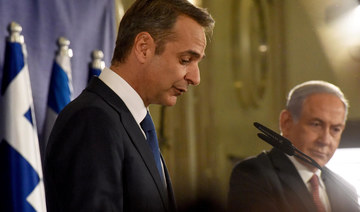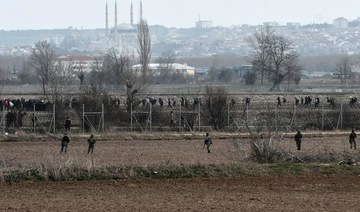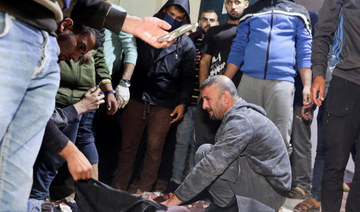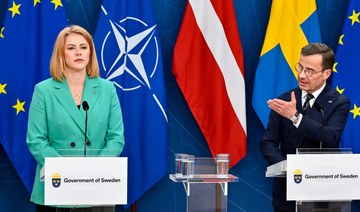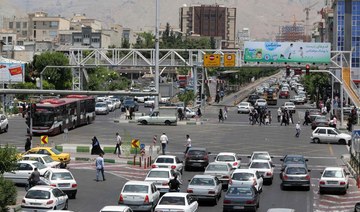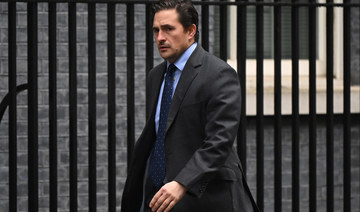ATHENS, Greece: Greece’s foreign minister accused Turkey on Wednesday of undermining stability and security in the eastern Mediterranean and causing problems with all of its neighbors, while also violating Greek airspace and territorial waters daily.
Nikos Dendias slammed Turkey’s actions in recent months in the Aegean Sea, which separates the two countries, saying Ankara must “abstain from its illegal gunboat diplomacy.” Dendias spoke during a visit to Greece’s northeastern border with Turkey, accompanied by European Union foreign policy chief Josep Borrell.
NATO allies and neighbors Greece and Turkey have long had difficult relations, and the two countries have come to the brink of war three times since the 1970s. Divided over a series of issues, including territorial disputes in the Aegean, relations have become increasingly strained in recent months.
Earlier this year, Turkish President Recep Tayyip Erdogan declared the borders with Europe were open to migrants living in Turkey who wanted to head into the European Union. Although Turkey also shares a border with EU member Bulgaria, it was only on the Greek land border crossing that tens of thousands of migrants gathered, demanding to be allowed to cross.
Dendias described the action as “the exploitation, on the part of Turkey, of the hopes of tens of thousands of civilians for a better life ... misled through a disinformation campaign orchestrated by Turkish officials at the highest level.”
Dendias and Borrell toured the Kastanies border crossing in the Evros region where the migrants had gathered in late February.
“It’s very clear that we are determined to protect the external borders of the European Union and to strongly support Greece’s sovereignty,” Borrell said.
The EU foreign policy chief said his visit to Greece had been planned but had been pushed forward after recent incidents involving Turkey “in order order to show our solidarity and to show how much we share your concerns.”
Greece and Turkey are also in dispute over oil and gas exploratory drilling rights in the Mediterranean, with Greece, Cyprus and Egypt outraged at a Turkish agreement with the UN-recognized government in Libya laying claim to rights of a swathe of the Mediterranean that they say infringes on their sovereign rights.
Borrell said he and Dendias had discussed the deteriorating relations with Turkey and “about how we can stop the dynamics of escalation.”
Dendias said that after a brief respite while countries dealt with the coronavirus pandemic, “Turkey has once again declared that its land borders to Europe are open. At the same time, its coast guard escorts boats laden with migrants to the Greek islands. But it also persists in undermining security and stability, as well as peace, in the Eastern Mediterranean.”
The Greek minister accused Turkey of “continuously violating the sovereignty of Libya, Syria, Iraq and our EU partner, the Republic of Cyprus. It is violating almost daily Greece’s national airspace and territorial waters, including overflights of inhabited areas here in Evros and the Aegean Sea by armed warplanes.”
He said that while Greece was “open to dialogue” to resolve differences with its neighbor, “we are not prepared to discuss under duress or help legitimize Turkey’s persistent violations of legality.”
Borrell stressed the importance of good relations for all involved.
“I think this is in our interests and the interests of the European Union, Turkey and Greece to try to solve the current difficulties and improve the current relations,” he said.
Greece slams Turkey’s actions in Aegean, eastern Med
https://arab.news/76gj4
Greece slams Turkey’s actions in Aegean, eastern Med
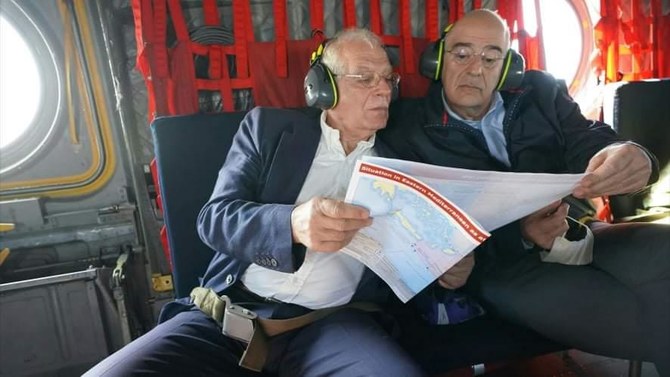
- Greek FM Dendias and EU foreign policy chief Borrell toured the Kastanies border crossing in the Evros region where migrants had gathered in late February
- The EU foreign policy chief said his visit to Greece had been planned but had been pushed forward after recent incidents involving Turkey
UK’s foreign secretary supported arms sales to Israel days after British aid workers killed in Israeli strike
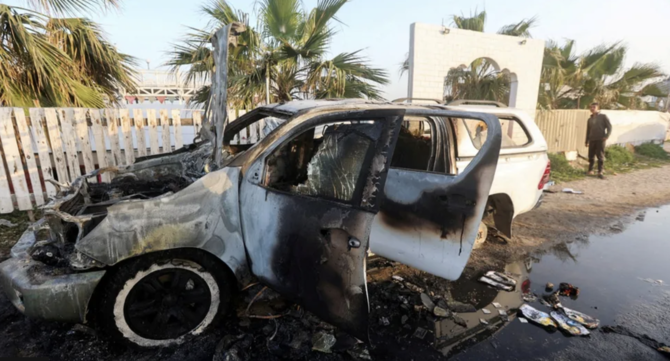
- Attack on World Central Kitchen convoy killed 7 people in total
LONDON: Britain’s foreign secretary recommended that the UK continue selling arms to Israel just days after an Israeli strike on a World Central Kitchen convoy killed three British aid workers.
David Cameron supported the continuation of arms sales two days after the strike on April 1, and the Secretary of State for Business and Trade Kemi Badenoch approved the decision on April 8, The Guardian reported on Thursday.
Cameron said earlier this week that the strike that killed the Britons, in addition to four aid workers of other nationalities, revealed systemic and personal failures by members of the Israel Defense Forces.
Cameron’s decision seems to have been based on an assessment of Israeli compliance with humanitarian law that did not cover the deaths of the aid workers due to a time lag in the government’s process for deciding if British arms exports were at risk of being used to commit war crimes.
There was a possibility that the business department’s assessment did not cover any incidents after Jan. 28.
An update on the handling of arms export licenses that took into consideration events up until the end of February was prepared, but the British Foreign Office has declined to say if that was included in the advice given to ministers.
Opposition Labour MPs claim the time delay means there is a possibility that no comprehensive ministerial-level assessment of Israel’s conduct of the war in Gaza has been made in the last three months.
Lawyers and campaigners who have examined the evidence provided by the Foreign Office have come to the same conclusion.
World Central Kitchen said on Monday it would resume operations in the Gaza Strip, a month after the Israeli airstrike.
Prior to halting operations, WCK had distributed more than 43 million meals in Gaza since October, representing by its own accounts 62 percent of all international nongovernmental aid.
NATO condemns Russian ‘malign activities’ on its territory

- The incidents “are part of an intensifying campaign of activities” Russia is carrying out across the Euro-Atlantic area
- NATO allies “express their deep concern over Russia’s hybrid actions, which constitute a threat to allied security“
BRUSSELS: NATO on Thursday condemned Russian “malign activities” on its territory, saying actions like disinformation, sabotage, violence and cyber interference threatened the alliance’s security.
The incidents “are part of an intensifying campaign of activities” Russia is carrying out across the Euro-Atlantic area and NATO allies “express their deep concern over Russia’s hybrid actions, which constitute a threat to allied security,” NATO said in a statement.
Authorities in the Czech Republic, Estonia, Germany, Latvia, Lithuania, Poland and Britain have recently investigated and charged people in connection with “hostile state activity.”
NATO said allies would work together to deter and defend against the hybrid actions and that they would remain steadfast in supporting Ukraine as it struggles to fend off Russia’s invasion, now in its third year.
Last month, a 20-year-old British man was charged with masterminding an arson plot against a Ukrainian-linked target in London. Moscow’s ambassador Andrey Kelin dismissed claims of links to Russia as “absurd” and “unfounded.”
In late March, Czech authorities said they had busted a Moscow-financed network that spread Russian propaganda and wielded influence across Europe, including in the European Parliament.
Israeli private eye arrested in UK over alleged hacking for US PR firm

- An initial attempt to extradite Amit Forlit to the United Sates was thrown out by a judge at Westminster Magistrates’ Court on Thursday
- Forlit was arrested under an Interpol red notice at London’s Heathrow Airport
LONDON: An Israeli private investigator wanted by the United States was arrested in London over allegations that he carried out a cyberespionage campaign on behalf of an unidentified American PR firm, a London court heard on Thursday.
An initial attempt to extradite Amit Forlit to the United Sates was thrown out by a judge at Westminster Magistrates’ Court on Thursday on a legal technicality.
Amy Labram, a lawyer representing the United States, had told the court that Forlit “is accused of engaging in a hack for hire scheme.”
Labram said that the US allegations include that an unnamed Washington-based PR and lobbying firm paid one of Forlit’s companies 16 million pounds ($20 million) “to gather intelligence relating to the Argentinian debt crisis.”
Forlit was arrested under an Interpol red notice at London’s Heathrow Airport as he was trying to board a flight to Israel, according to the USauthorities.
Forlit is wanted in the US on three charges: one count of conspiracy to commit computer hacking, one count of conspiracy to commit wire fraud and one count of wire fraud.
A judge ruled that the attempt to extradite Forlit by the United States could not continue as he was not produced at court within the timeframe required under British extradition law.
“He was not produced at court as soon as practicable and the consequences of that ... he must – I have no discretion – he must be discharged,” Judge Michael Snow ruled.
Forlit and his lawyer did not immediately return messages seeking comment. The Federal Bureau of Investigation did not immediately return a message.
Forlit has separately been accused of computer hacking in New York by aviation executive Farhad Azima. Azima, whose emails were stolen and used against him in a 2020 trial in London, is suing Forlit and others in federal court in Manhattan.
Forlit has previously acknowledged retrieving Azima’s emails but has denied hacking, telling Reuters he innocently stumbled across the messages “on the web.”
Death toll jumps to at least 48 as a search continues in southern China highway collapse
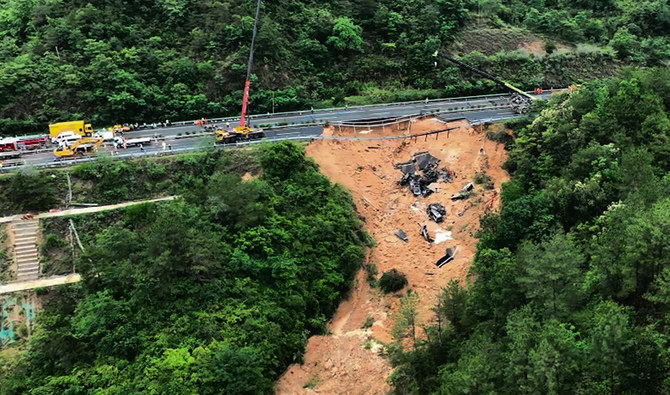
- One side of four-lane highway in Meizhou city gave way after a month of heavy rains
- Twenty-three vehicles fell down a steep slope, some sending up flames as they caught fire
BEIJING: The death toll from a collapsed highway in southeastern China climbed to 48 on Thursday as searchers dug for a second day through a treacherous and mountainous area.
One side of the four-lane highway in the city of Meizhou gave way about 2 a.m. on Wednesday after a month of heavy rains in Guangdong province. Twenty-three vehicles fell down a steep slope, some sending up flames as they caught fire. Construction cranes were used to lift out the burnt-out and mutilated vehicles.
Officials in Meizhou said three other people were unidentified, pending DNA testing. It wasn’t immediately clear if they had died, which would bring the death toll to 51. Another 30 people had non-life-threatening injuries.
The search was still ongoing, Meizhou city Mayor Wang Hui said at a late-afternoon news conference. No foreigners have been found among the victims, he said.
Search work has been hampered by rain and land and gravel sliding down the slope. The disaster left a curving earth-colored gash in the otherwise verdant forest landscape. Excavators dug out a wider area on the slope.
“Because some of the vehicles involved caught fire, the difficulty of the rescue operation has increased,” said Wen Yongdeng, the Communist Party secretary for the Meizhou emergency management bureau.
“Most of the vehicles were buried in soil during the collapse, with a large volume of soil covering them,” he said.
He added that the prolonged heavy rainfall has saturated soil in the area, “making it prone to secondary disasters during the rescue process.”
Over 56 centimeters (22 inches) of rain has fallen in the past four weeks in the county where the roadway collapsed, more than four times as much as last year. Some villages in Meizhou flooded in early April, and the city has seen more rain in recent days.
Parts of Guangdong province have seen record rains and flooding in the past two weeks, as well as hail. A tornado killed five people in Guangzhou, the provincial capital, during rain and hail storms last weekend.
The highway section collapsed on the first day of a five-day May Day holiday, when many Chinese are traveling at home and abroad.
Chinese leader Xi Jinping said that all of China’s regions should improve their monitoring and early warning measures and investigate any risks to ensure the safety of the public and social stability, state broadcaster CCTV said.
UK Veteran’s Minister Mercer to risk jail over Afghanistan inquiry
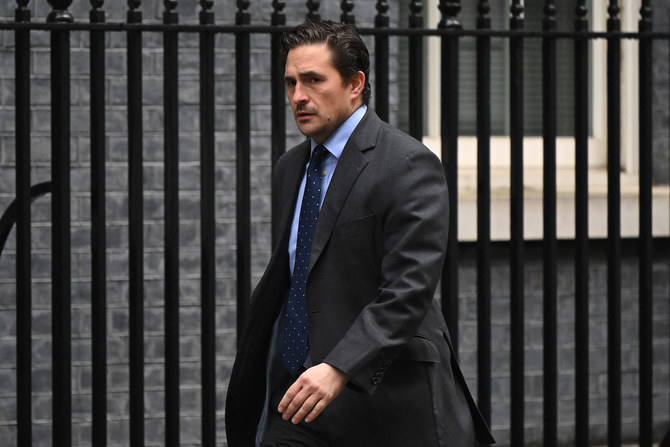
- Friends suggest minister will refuse to hand over identities of whistleblowers over fears for their well-being
- Mercer faces potential 52-week jail term, which would cost him his role as a minister and MP
LONDON: UK Veteran’s Minister Johnny Mercer will risk prison by not revealing the identities of whistleblowers to an inquiry investigating the killings of innocent people in Afghanistan.
The Times reported that friends of the MP had suggested he would rather be a “man of integrity” over the matter ahead of a deadline to hand the names to the inquiry, chaired by Lord Justice Haddon-Cave, next week.
Mercer has already given evidence to the inquiry, which is investigating allegations of extrajudicial killings and cover-ups by UK Special Forces between 2010 and 2013.
Appearing in February, he said a Special Forces soldier told him that in 2017 he was asked to carry a weapon to plant on an unarmed civilian to make them seem like an enemy combatant. He refused to reveal the source and others out of fear for their safety, with suggestions that some may be suffering from post-traumatic stress disorder and could be mentally vulnerable.
Haddon-Cave gave Mercer until April 5 to reveal the names, which was later extended. Failure to comply, he was warned, could result in a year-long prison term, which would cost him his job as a minister and his position as an MP. He could also face a fine.
One friend of the MP told The Times: “The inquiry doesn’t seem to realise that nothing will destroy their authority more than putting the veterans’ minister in the dock — the one man the military community trusts.
“If they do this, no one from the military community will want to co-operate with the inquiry. They seem to think Mercer will fold under the pressure and they will get their way. But he won’t. He will go down as a man of integrity and the inquiry will lose all support.”
Former Armed Forces Minister James Heappey said Mercer should reveal the identities of his sources.
“I admire Johnny enormously for the way that he has done politics under his own rules with an incredible sense of mission … He is a remarkable man but on this particular point I think for him, for his family and actually for the credibility of the inquiry I think he does need to disclose these names,” Heappey said.
On Friday, the inquiry will examine the Ministry of Defence’s failure to provide evidence to it on time. It is still waiting to hear from senior officials, including former Defence Secretary Ben Wallace.
It has also heard allegations that Gen. Gwen Jenkins, future national security advisor and former Special Boat Service head, locked away a report into claims of extrajudicial killings instead of passing it to military police.
Mercer also suggested during the inquiry, which began in December 2022, that the next head of the UK Army Lt. Gen. Sir Roly Walker had given “unbelievable” testimony over claims that Special Air Service personnel had killed unarmed Afghans.
An investigation by The Times, meanwhile, has suggested that former members of specialist Afghan Army units CF 333 and ATF 444 could provide crucial witness testimony to the inquiry but that their subsequent relocation from Afghanistan was overseen by MoD officials in a potential conflict of interest.
Many had their asylum claims to come to the UK rejected, a decision now under review.



